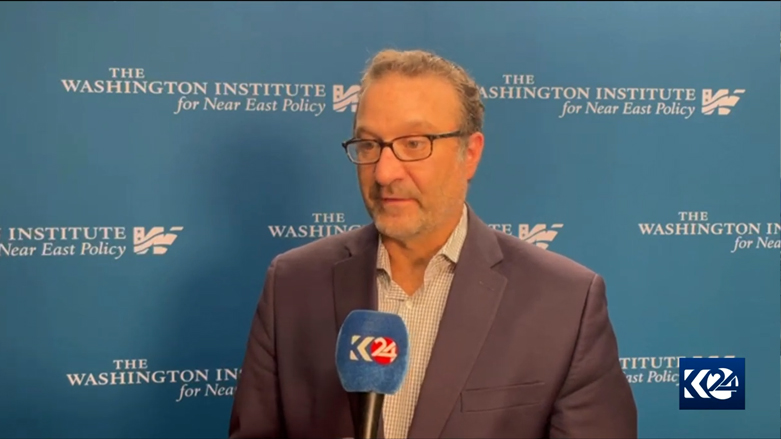David Schenker: Biden administration needs to be actively involved in Iraq

WASHINGTON DC, United States (Kurdistan 24) – Former Assistant Secretary of State for Near East Affairs, David Schenker, spoke with Kurdistan 24 on Tuesday and affirmed the need for the Biden administration to become more involved in Iraq.
The Biden administration had adopted a relatively passive attitude toward Iran’s efforts to advance its influence in Baghdad, as Tehran promotes its allies there. Such passivity has prompted criticism from members of Congress, as well as analysts, including Schenker.
Indeed, Schenker pointedly summarized the Biden administration’s decision to distance itself from the politics of government formation in Iraq in a recent article in Foreign Policy magazine: “As one anonymous senior Biden administration official said rather indifferently last December,” following the October elections, “their plan was to ‘leave it to the Iraqis to sort out.’”
Schenker’s remarks to Kurdistan 24 on Tuesday came the day before President Joe Biden spoke with Iraqi Prime Minister, Mustafa al-Kadhimi, perhaps indicating that the administration has heard its critics, and its relative aloofness from Iraq’s political strife is coming to an end.
Read More: Biden expresses support for Kadhimi in phone call
Indeed, in another Kurdistan 24 interview earlier this week, with Amb. James Jeffrey, who heads the Middle East Program at the Wilson Center and before that served as US ambassador to Iraq (2010-12), Turkey (2008-10), and Albania (2002-04), as well as Special Representative for Syria Engagement and Special Envoy to the Global Coalition To Defeat ISIS (2018-20), added his voice to those critical of the Biden administration’s relative passivity on Iraq.
“We, the United States, have not been active enough in working with our friends and national forces in Iraq to push back on the Iranian seizure of the constitutional system, which we have seen since the elections last year,” Jeffrey said.
Schenker: US wasn’t seriously Involved in Iraqi Government Formation
“I just don’t believe that the United States over the past nine, ten months of [Iraqi] government formation has really been involved at the highest of levels,” Schenker told Kurdistan 24 on Tuesday.
He noted that Sadr received “a plurality of the votes,” more than any other candidate and then tried to form a majority government—as happens routinely in democratic countries.
However, Sadr planned to eliminate the ministerial positions of the pro-Iranian parties. They had lost the elections! That is how every democracy works. However, in Iraq, the post-Saddam political class believes that no matter what the outcome of the vote, they are entitled to ministries!
Sadr first rose to prominence in Iraq following the 2003 US-led war that overthrew Saddam Hussein and his regime, and he was strongly anti-American. Nonetheless, as Schenker told Kurdistan 24, the fact that Sadr is now “articulating a policy of neither West nor East, neither the United States nor Iran, suggests that he may have been interested in trying to assert Iraqi sovereignty, and that, from where I sit, would have been a good thing.”
“Yet the Biden administration appears to have been indifferent to the results of the election,” Schenker continued, “and the possibility of having a different type of Iraqi government,” that was not “the Iranian-controlled, [Iranian]-backed status quo.”
Schenker took issue with the Kurdish position, however, because the Kurds were divided. “Early on,” he said, “I think the Kurds, had they voted in one block could have helped Sadr form that majoritarian government, but there were differences between Kurdish political parties, particularly about who would be the next President of Iraq.”
In the end, the biggest vote-winner among the Kurds, the Kurdistan Democratic Party (KDP), sided with Sadr, while the Patriotic Union of Kurdistan (PUK) sided with the pro-Iranian parties.
